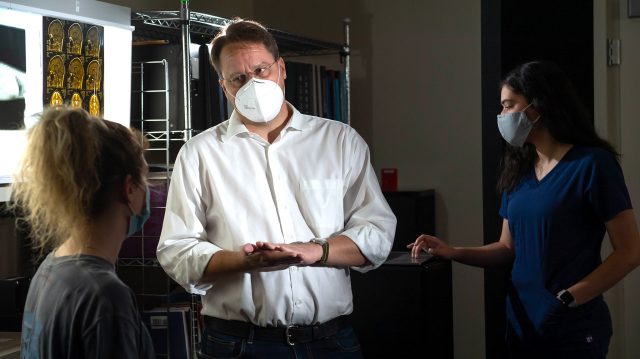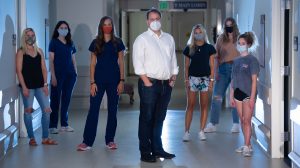
Katelyn Geringswald (left), a senior from Olive Branch, joins Greg Snyder, UM associate professor of communication sciences and disorders, and Peyton McKnight, a first-year graduate student from Gulfport, in the SSTAR Lab as they examine brain scans. Photo by Kevin Bain/Ole Miss Digital Imaging Services
OXFORD, Miss. – Between 5 percent and 10 percent of all children stutter at some phase of their lives, according to estimates by the National Institute on Deafness and Other Communication Disorders. Faculty and student researchers in the University of Mississippi Department of Communication Sciences and Disorders are investigating ways to help people of all ages affected by the condition.
The department’s Stuttering Science, Therapy, Advocacy and Research Lab focuses its research on the science of stuttering as a means to create new treatment options. The SSTAR Lab also offers clinical services through the UM Speech and Hearing Center and serves as a training site for future speech-language pathologists learning to provide holistic patient care for those who stutter.
Greg Snyder, associate professor of communication sciences and disorders, worked with former students Molly Grace Williams and Caroline Adams on the lab’s most recent work, a study of stuttering and disclosure in children.
The team’s research is detailed in “The Effects of Different Sources of Stuttering Disclosure on the Perceptions of a Child Who Stutters,” published in the latest edition of Language, Speech, and Hearing Services in Schools, a peer-reviewed journal of the American Speech-Language-Hearing Association. Disclosure is simply when a person affirms that he or she stutters.
“Dr. Snyder is investigating disclosure of stuttering, which is one of the important avenues for managing stuttering,” said Vishaka Rawool, chair and professor of communication sciences and disorders. “Stuttering can be concealed if a child chooses to keep quiet or only says a few utterances.”
When children disclose or share the fact that they stutter, it can reduce the perceived pressure to hide stuttering and increase self-esteem, confidence and quality of life, Rawool said.
“In addition, disclosure has the potential to reduce the negative effects children can sometimes perceive or experience, including negative stereotypes, stigma, anxiety, depression and bullying,” she said. “Dr. Snyder’s continuing research in this area is expanding our knowledge about the most effective means of achieving disclosure.”
The study is the first of its kind to measure the effects of advocate disclosure on attitudes toward children who stutter, Snyder said.
The work measures the effects of self-disclosure, mother-disclosure and advocate-disclosure on perceived speech skills and personality characteristics. Snyder and his students found there is a positive correlation between self- and advocate-disclosure, while a negative one when the mother takes on the responsibility.
“In essence, we’re trying to find better ways to give a voice to those struggling to find their own,” Snyder said. “Once you empower kids, kids will learn to empower themselves.
“The take-home point is that we’re going to solve this problem by increasing the resilience of children who stutter. We can’t fix the stuttering, but we can improve it.”

SSTAR Lab members include (from left) Tiffany King, a senior from Batesville; Peyton McKnight, a first-year graduate student from Gulfport; Peyton Padgett, a first-year graduate student from Frisco, Texas; Greg Snyder, UM associate professor of communication sciences and disorders; Rachel Davis, a junior from Jackson, Tennessee; Ashley Koehler, a junior from Pontotoc; and Katelyn Geringswald, a senior from Olive Branch. Photo by Kevin Bain/Ole Miss Digital Imaging Services
Rising seniors Katelyn Geringswald, of Olive Branch, and Madeline Simpson, of Houston, Texas, are continuing this research with Snyder, expanding their data on disclosure sources – including fathers, coaches and speech language pathologists – as a function of stuttering severity. They will also include the concept of perceived resilience in their data set.
“Stuttering was an area that I was not familiar with but was curious to learn more about,” Geringswald said.
“I hope that our research will help with changing negative stereotypes that people who stutter experience. We hope to be able to teach children who stutter to be more resilient against these negative stereotypes.”
Graduates of the program, including Williams and Adams, are using their research and practical experience at top programs around the country, Snyder said.
After graduating from UM with her master’s in communication sciences and disorders, Williams moved to Nashville, Tennessee, to work at Vanderbilt University Medical Center.
Her work there includes speech, language and cognitive communication and swallowing evaluations, and treatment at Vanderbilt’s acute center; educating caregivers and providing cognitive communication and swallowing therapy for patients with dementia in the memory care facility; and at-home help for a variety of cognitive communication and swallowing disorders with Brookdale Home Health.
“I stay very busy, but I love how my schedule is different each week and I am constantly challenged by these different settings,” Williams said. “Although I do not currently work with people who have a stutter, I believe that those experiences taught me the value of research and how to provide evidence-based treatment for my patients.”
Adams is in graduate school at the School of Behavioral and Brain Sciences at the University of Texas at Dallas, working toward her Doctor of Audiology degree.
“The older I get, the more I appreciate that so much of research in higher education is being an archer – sharpening these young professionals and then letting them loose into our world,” Snyder said.
While the SSTAR Lab’s most recent research focuses on the stuttering community’s emotional well-being and self-efficacy, the multidisciplinary team of faculty researchers leading the lab’s efforts are best known for developing a wearable vibratory/tactile feedback prosthetic device that typically reduces stuttering frequency by approximately 80%.
Snyder joined forces with Dwight Waddell, director of the UM biomedical engineering program, associate professor in electrical engineering and research associate professor in exercise science, and Paul Goggans, a professor of electrical engineering, to develop and patent the technology.
“Sharing the SSTAR Lab’s vision with colleagues, current students and alumni as a means of helping the underserved stuttering community is beyond fulfilling,” Snyder said. “The ability to live and work in an environment that supports the investment into stuttering research, our students and alumni has been exceedingly rewarding; it’s been an incredible blessing to be a part of the Ole Miss family.”
For more information about UM programs in communication sciences and disorders, visit https://csd.olemiss.edu/.